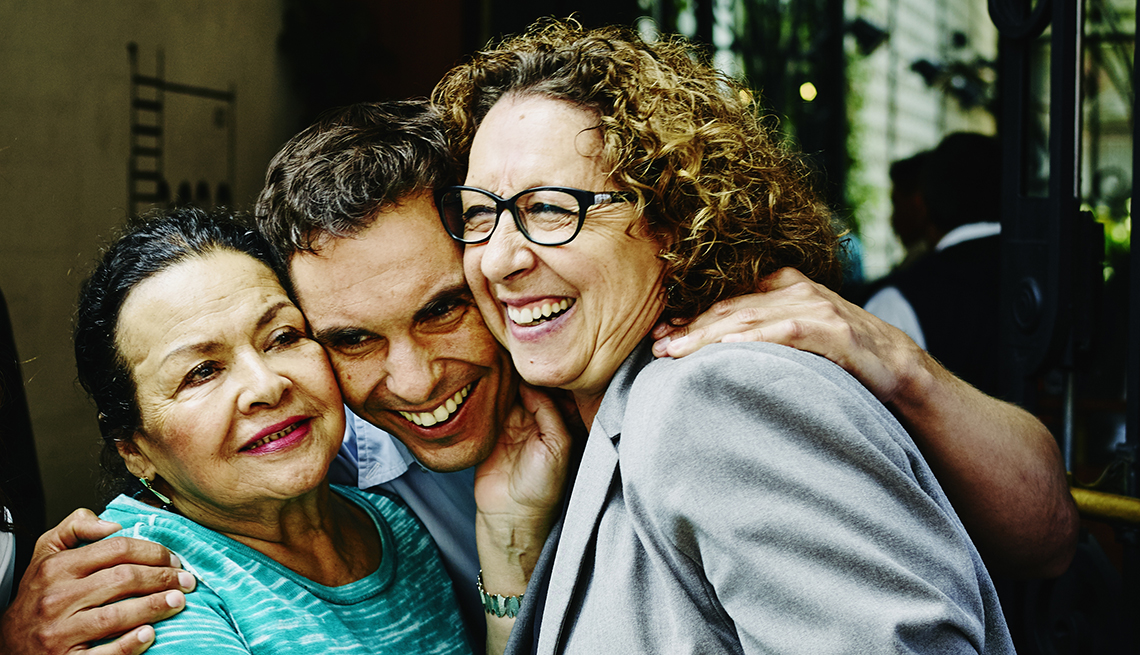Salud, Dinero & Amor in the Time of COVID-19
Hispanics Cite Emotional and Financial Concerns During the Coronavirus Pandemic
Hispanics have a range of concerns about the COVID-19 pandemic, according to a recent AARP survey. Respondents cited mental health, financial security, a coronavirus vaccine, and voting, but they also said that family connections have helped sustain them through this difficult time.
Key Findings
A majority of Hispanics 35-plus say they or someone they know has contracted COVID-19.
- Almost six in ten (58%) Hispanics surveyed have experienced COVID-19 or know someone who has. Ten percent have had the virus in their household, and half (51%) know someone not in their household who has had COVID-19, a substantially higher share than 36% of non-Hispanic adults surveyed.
Hispanics are concerned about staying healthy, surviving economically, and when the pandemic will end.
- Three-fourths of Hispanics surveyed are concerned about the impact of COVID-19 on the U.S. economy and having to deal with the pandemic beyond 2020.
- Two-thirds (68%) are concerned about themselves or someone in their family contracting COVID-19 and nearly as many are concerned about not surviving it (64%).
- Nearly one in five (18%) Hispanics surveyed have lost their job or were furloughed during the pandemic, and 26% have lost income.
The pandemic has taken a toll on mental health, especially for Gen X and older Millennial Hispanics.
- The prevalence of COVID-19 among Hispanics together with the financial shocks and uncertainty have contributed to very widespread and deep feelings of stress and worry. Large majorities report a range of negative emotions during the pandemic such as stress (79%), frustration (75%), lack of power/control (69%), anxiety (70%), fear (70%), and sadness (71%).
- Three-fourths of Hispanics surveyed say they have had difficulty dealing with the pandemic on a personal level.
- Nearly every measure of self-reported emotional or mental health indicates more stress among those ages 35–49 overall. Almost one in three (31%) are "extremely concerned" about the their own mental health or the mental health of others in their families, and more than more than one in three (38%) report their mental health has worsened during the pandemic.
Family connections have been a protective factor.
- Connection to family has been a sustaining factor during this time with 84% of Hispanic respondents feeling connected to family.
For now, a vaccine is only a hope until we have the data and backing of experts.
- While a vaccine is expected to be available in the future, only a moderate share of Hispanics surveyed say they are likely to be vaccinated: 29% are “very likely,” and another 17% are “somewhat likely.” One-fourth each are unlikely (26%) or unsure (28%).
- The top three affecting the decision to get the vaccine are large scientific studies that show no side effects (48%), proven effectiveness (46%), and FDA approval (40%).
- Doctors and nurses are the most trusted sources of honest and factual information about COVID-19.
Most consider the Latino vote important, but there are some signs of voter apathy and lagging public trust in U.S. democratic elections.
- A majority of respondents (55%) say the country is on the wrong track, and the federal government's response to COVID-19 pandemic is largely seen as a failing: 48% say the U.S. government response has been poor or terrible and 32% give it an “okay” rating.
- In this context, a majority (58%) acknowledge that the presidential election is “extremely” important and (71% believe it is important that Latinos vote to make their voices heard.
- At the same time, nearly four in ten (39%) express concerns about fairness of the election in general, and one in three (36%) are concerned about potential violence after the election. With looming uncertainty about election legitimacy, nearly one in four (23%) eligible Hispanic voters ages 35–49 say they either won’t vote (11%) or might not vote (12%).
- In this chaotic election year, a majority (55%) of Hispanic likely voters surveyed plan to vote either early in person (22%) or absentee by mail (33%).
Methodology
This survey of 1,000 Hispanic adults ages 35 and older explored how people are coping with the COVID-19 pandemic, their attitudes about a possible COVID-19 vaccine, and their opinions about the 2020 presidential election. A sample of 350 non-Hispanic adults was also included for comparison. Interviews were conducted September 1–13, 2020.
Suggested citation:
Houghton, Angela. Salud, Dinero & Amor in the Time of Covid-19. Washington, DC: AARP Research, October 2020. https://doi.org/10.26419/res.00412.001
Search AARP Research
Enter a keyword below to find answers to your AARP Research questions.
Social Connections
Not Alone in Loneliness
About one third of U.S. adults age 45 and older report feeling lonely, an increase of approximately 5 million more people compared to eight years ago.
Find Out More

